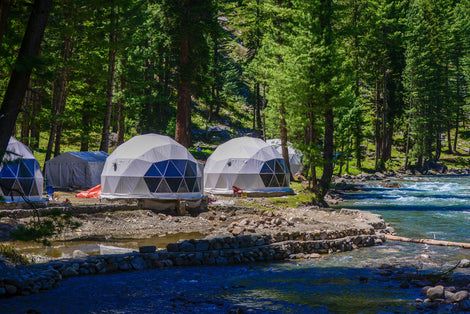Tips for Purchasing a Satellite Phone for Emergency Uses
Being able to reach others in an emergency can make a big difference. Whether you’re hiking in a remote area, traveling through places with limited cell signal, or planning for worst-case scenarios, having a communication backup is smart. That’s where satellite phones come in. They connect through satellites instead of cell towers, giving you coverage in places you wouldn’t normally have any.
More people are taking a closer look at their emergency readiness, and grabbing the right tools is a big part of that. When regular phones stop working after a natural disaster or power outage, for example, a satellite phone helps you stay in touch or call for help. But not all satellite phones are the same, and choosing one isn’t always straightforward. Here are some key details to keep in mind before you make a purchase.
Understanding Satellite Phones
Satellite phones, often just called sat phones, don’t rely on cell towers like your everyday smartphone does. Instead, they work by connecting to satellites that orbit above the Earth. This gives them the ability to work in remote places like mountains, oceans, and deserts, where cell reception is usually spotty or doesn’t exist at all.
They’re made for tough situations and are meant to be dependable when normal options fail. Let’s say you’re deep in the woods, well outside of range. A satellite phone could still connect you to emergency services, friends, or family, as long as you’ve got a clear line to the sky. That connection could mean peace of mind or even save lives.
Compared to regular smartphones, satellite phones are usually a bit bulkier. They don’t offer all the usual apps and full-color touchscreens. Instead, their primary use is voice calls and sometimes text messaging. That simplicity is part of what makes them dependable. They leave out the extras so the function that matters—staying connected—isn't interrupted.
Here are a few advantages of using satellite phones for emergency needs:
- Work in areas with no cell or internet signal
- Often more water- and weather-resistant than typical phones
- Built to withstand extreme conditions and impact
- Can be used for voice calls or short messages during low-power mode
While they aren’t devices you’d use day-to-day for fun, satellite phones offer a solid backup when your regular service drops out. Knowing how they work helps set the stage for picking the right one for your situation.
Key Features to Look For When Purchasing
When considering the purchase of a satellite phone for emergencies, there are a few important features that make a big difference. You’ll want something tough, reliable, and functional enough to count on when you need it most. Here's what to look for:
1. Durability
Emergencies don’t happen on a smooth schedule or in perfect weather. That means you need a device that’s designed to handle rough moments. Look for a phone that’s impact-resistant, waterproof, and sealed to keep out dust. Whether you're caught in a rainstorm or on a rocky trail, the phone should still work without issue.
2. Battery Life
If power goes out or you're away from a charger, battery life becomes a top priority. Some satellite phones offer standby times of several days and come with low-power modes to stretch life even longer. Pay attention to the talk time and standby time specs. It’s also worth checking whether extra battery packs or solar charging accessories are available.
3. Global Coverage
Not all satellite networks work the same way. Some cover only certain regions, while others work almost everywhere. If you're buying for general emergency use, especially for natural disasters or travel in unfamiliar places, make sure the phone connects to a wide-reach satellite network. That way, you're not left guessing whether your phone will actually get a signal when it matters most.
4. Ease of Use
During high-stress situations, a simple interface can make things easier. Look for phones with physical buttons, clear displays, and menus that don’t take a user manual to navigate. If you need to hand the phone over to someone else in an emergency, it should be easy enough for them to figure out, too.
By choosing a phone with these key features, you're not just buying a device. You're adding a layer of security to your travel or emergency kit. These details mean the phone’s more likely to work when you need it, wherever you are.
Factors to Consider Before Buying
Selecting the right satellite phone involves a few considerations beyond just features. One of the major factors is cost. While it might seem like a bigger expense upfront compared to your smartphone, the value of having dependable communication during an emergency is hard to match. Think about both the price of the device and the ongoing cost of service plans.
Service plans come in all shapes and sizes. Some offer pay-as-you-go pricing, while others come with monthly subscriptions. Ask yourself how often you'll be using the phone and for what purposes. If it’s just for rare emergencies or travel once a year, you may not need unlimited coverage.
Here are a few points to keep in mind when looking at service plans:
- Coverage: Check that the plan includes areas where you’ll likely be.
- Minutes and Texts: Understand how much communication you can do within the plan.
- Data Availability: While not all sat phones offer data features, some allow very basic data services which could come in handy.
Along with service, accessories can help improve how you use your phone. External antennas can give you stronger reception, especially in tricky spots like thick forests or valleys. Solar chargers or spare battery packs are also great additions, giving you power when there’s no outlet in sight. These extra bits aren’t always necessary but can definitely increase how reliable your setup feels in real-world use.
Choosing the Right Seller
Where you buy your satellite phone matters just as much as the product itself. A credible seller makes the whole process smoother and safer. Start by checking customer reviews and looking into how long the company has been around. A good seller will guide you through options and be there after the purchase if problems come up.
Support is another big one. Does the seller offer access to setup guidance or help if your phone acts up later? Warranties also matter, so make sure your purchase isn’t a gamble. If anything breaks or doesn't perform as expected, having that layer of protection saves time, money, and stress.
Something else to double-check is regional certification. Some satellite phones work fine globally, but others are only usable in certain countries. Certification means the phone meets local rules and connects correctly with available networks. That’s an important step if you plan to rely on the phone in different locations.
Peace of Mind Through Preparation
When you're shopping for a satellite phone, look for models that bring together long battery life, strong coverage, and a build that can handle stress. Choosing the right device means being ready when regular communications break down. Compare service plans to find one that fits the way you might actually use the phone. Don’t forget to factor in costs, accessories, and ongoing peace of mind.
Where and how you buy matters, too. Stick with a trusted seller who offers support and makes your buying experience simple. A good satellite phone isn't just a gadget. It's a backup plan that helps protect you and your loved ones when things don’t go as planned.
Whether you're headed out into remote terrain or simply adding to your emergency supplies, the right satellite phone helps you stay safe, informed, and connected—no matter where you are.
When you’re ready for the purchase of a satellite phone that fits your emergency needs, explore the options at Green Vista Living. Our selection offers dependable designs with wide coverage so you can stay in touch wherever life takes you. Find a phone that works for your lifestyle and gives you added confidence when it counts.







